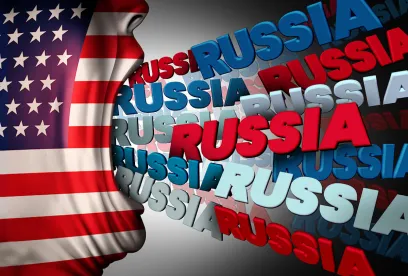U.S. Imposes Sanctions in Response to Russia's Invasion of Ukraine
The U.S. imposed sanctions in response to Russia's invasion of Ukraine and recognition of two separatist regions.
President Joseph R. Biden signed Executive Order ("EO") 14065 blocking trade and most other dealings involving the so-called Donetsk People's Republic or Luhansk People's Republic regions of Ukraine. EO 14065 expands the scope of the national emergency declared in EO 13660 of March 6, 2014 (see previous coverage). In connection with EO 14065, OFAC issued Ukraine General Licenses 17, 18, 19, 20, 21 and 22, which provide a one-month period to wind down transactions involving the sanctioned regions, among other authorizations.
OFAC added two Russian banks and numerous related entities to its Specially Designated Nationals and Blocked Persons List (the "SDN List") pursuant to EO 14024. This action immediately blocks those banks and all entities of which they own 50 percent or more (whether or not such entities are specifically named on the SDN List), and U.S. persons are generally prohibited from engaging in any dealings with them. Relatedly, OFAC issued General License 3 under EO 14024 to authorize certain wind down transactions involving VEB until March 24, 2022.
OFAC also expanded existing prohibitions on dealings in Russia's sovereign debt. As of March 1, 2022, U.S. financial institutions will be prohibited from participating in the secondary market for bonds issued after that date by the Central Bank of the Russian Federation, the National Wealth Fund of the Russian Federation or the Ministry of Finance of the Russian Federation. In connection with this prohibition, OFAC issued General License 2 under EO 14024, published new FAQs 964 and 965, and updated several other FAQs.
Commentary by James Treanor
No one expects that this modest initial round of sanctions will be the last, absent an unexpected halt to the roll of Russian tanks. Already, questions abound, for example, as to the reach of sanctions on the two separatist regions - the claimed territory of which remains, in large part, under the control of the Ukrainian government. If the conflict continues to escalate, bigger sanctions targets are sure to be identified in Russia's financial and energy sectors, the ramifications of which will be felt globally.
FASB Considers Investor Feedback on Climate Change and Digital Assets
The Financial Accounting Standards Board ("FASB") considered feedback received in response to an Invitation to Comment - Agenda Consultation on its standard-setting process and future standard-setting agenda items.
The summary focused on:
-
the disaggregation of financial reporting information;
-
climate-related transactions and disclosures; and
-
digital assets.
Respondents urged:
-
broader disclosures of financial statements regarding the impact of climate-related issues; (FASB noted that it is considering the accounting for, and disclosure of, financial instruments with climate-linked features); and
-
FASB to permit or require issuers to account for certain digital assets at fair value (FASB added a project to its research agenda addressing the accounting for exchange-traded digital assets and commodities.)
FINRA Retains Independent Counsel to Examine Arbitrator Selection Process
FINRA's Audit Committee retained independent counsel to review the arbitrator selection process in a proceeding in which an award was vacated by a judge in an Atlanta Superior Court.
FINRA said that the independent review would determine whether FINRA's Dispute Resolution Services ("DRS") "complied with its rules, policies and procedures for arbitrator selection." FINRA stated that it wanted to ensure that DRS provided a "fair and neutral" arbitration forum, and that the outside law firm was conducting the review to examine if "improvements to the process may be warranted." FINRA noted that its members are not required to use its Dispute Resolution Services, and that FINRA operates the forum pursuant to SEC-approved rules.




 />i
/>i
